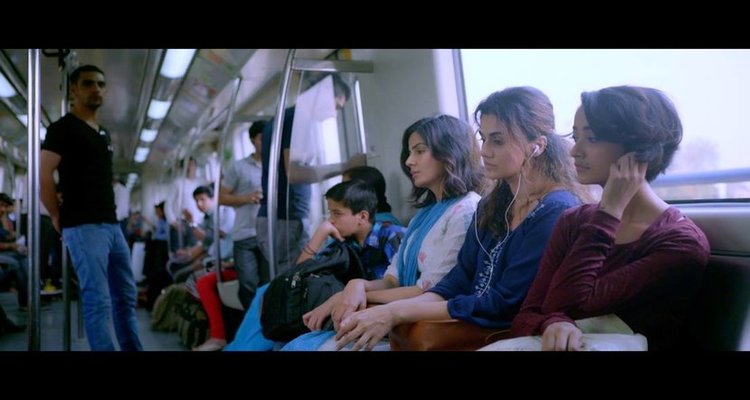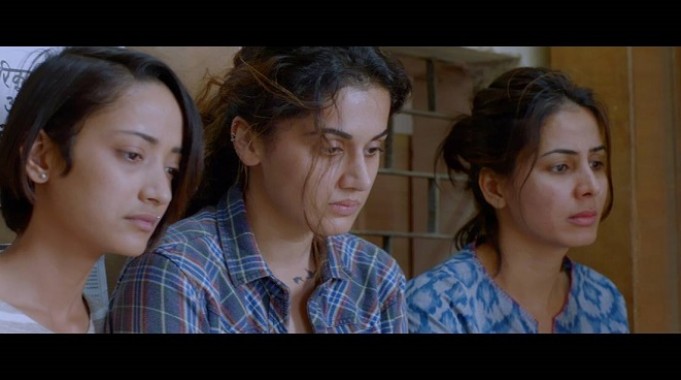India’s Pink Revolution?
FIGHTING BACK: The protagonists in a still from the film, Pink
“This woman deserves to be raped.”
“Had you called your rapist, ‘brother’, he wouldn’t have raped you.”
“We don’t register a rape FIR from a single woman who returns home from a pub late at night after drinking.”
We all hear misogynistic comments like these. So did film director Aniruddha Roy Chowdhury and they revolted him. “Daily news reports about crimes against women would disturb me. I thought that I needed to do something about it. Simultaneously, what upset me was moral policing. For instance a single woman told me that people of her neighbourhood threw her out of her apartment as she would party and her boyfriend and friends would visit her late in the evening. On Facebook, I read about a woman who was beaten up because she visited a pub,” Chowdhury told The Hoot.
He approached Shoojit Sircar with the idea of a film to explain clearly to Indian men the meaning of consent in physical intimacy and the hypocrisy of moral policing. The result was Pink which powerfully explains that ‘no means no’. Writer Ritesh Shah makes it clear that a woman’s past sexual history, her independent nature, the fact that male friends visit her home or how she dresses, can never be taken as an indication that she is inviting sex; if she expresses her opposition to a sexual advance, she has to be taken seriously. It does not matter whether she is an acquaintance, a friend, a girlfriend, a sex worker or wife or – and this is another stereotype the film challenges – if she is from the north east. “No means no and when someone says no, you stop,” says the lawyer in the film, played by Amitabh Bachchan.
In the court room scene, the lawyer explains sarcastically how things work in India: “Being in a rock show is taken as a hint (that the girl wants to have sex). If she’s in a library or temple, that’s not taken as a hint. The venue decides a girl’s character.” He goes on: “In cities, men can live alone, but women can’t. Independent women living alone confuse our men… women consuming alcohol are considered characterless. For men, it’s considered just as a health hazard.”
Bhavna Jain, a writer based in Mumbai says: ‘Pink beautifully questions popular perceptions about working women. Much needed cinema, this.” Adds Rashmi Sharma, who co-produced the film, “The film is making a huge impact on India as it’s held a mirror to Indian society. People are seeing themselves in it.” Actor Manish Nawani, points out: “Indian families generally don’t discuss sexual harassment and consent.”
Pink, which was given a U/A certificate, is a family-friendly film, which has broadened the audience. For many women who have watched the film, the reaction is that this should have been made and shown to their parents long ago because it would have spared them a multitude of restrictions and constraints. Sircar said in a telephone interview to this writer that the best feedback he got was from an 18-year-old girl who was in tears after watching this film. “She said that she would make her parents watch Pink to make them understand that whatever restrictions on dressing, posture and visiting places they had imposed on her for being a girl were wrong.”
An article on thetimeliners.com carried the headline, ‘I Made My Mom Watch Pink to Help Her Recognize My Regressive Upbringing.’ Sudarshan Chakravarty of Youth Ki Awaaz, while analysing the impact of the film, wrote, “I need to confess that even I have judged many women based on certain situations. We as human beings tend to judge. It is an unfortunate instinct. This movie made me think, made me understand how even when men and women react in a similar way, we tend to judge them differently.”
Nawani points out Bollywood’s role in perpetuating the popular male view that when a woman says no, it doesn’t mean no – all it means is that she needs more persuasion. “The hero, who happens to be the stalker, ultimately ‘wins the heart’ of the heroine who is initially shown as warding off his advances. Pink asserts that a no can never be a yes.”

Pink was actually a film made for men
Priya Florence Shah, publisher and editor of naaree.com says, “Pink is a slap in the face of the macho, entitled Indian man who can't take ‘no’ for an answer.”
One interesting question about Pink is whether it is more important for men to watch it. MensXP carried an article with the headline, ‘Why men should watch Pink.’ Much of the commentary on the film has also focussed on the belief that the film is more applicable to men than women.
“Pink was actually a film made for men, for women it was an echo of what goes on in their hearts and minds,’ Shah says. Adds Sircar, “Both men and women are calling Pink ‘my film’.”
Pink was also intended to encourage women to fight for their rights under the law. For example, it shows the female protagonists using the Zero FIR which can be filed in any police station, irrespective of the jurisdiction or location of the event. It also calls for a reform in the way the police handle crimes against women. A special screening of the film was arranged for the Mumbai police to sensitise them on gender violence. Sircar says the top IPS officers liked it and recommended that it be shown to policemen and women of all ranks.
How have audiences in the smaller towns reacted to the film’s message? Some commentators expressed scepticism as to whether Pink could get across to mass audiences. Aanchal Arora of Huffington Post, wrote an article titled, ‘Pink Is A Powerful Film, Yet It's Also A Failure,’ based on the reaction of the rowdy men in the audience of PVR Allahabad, where she watched the film. But a reader, Satish Ambat, wrote in with an interesting observation: “The comments made by boys at PVR are probably because it challenges the same ego and makes them uncomfortable.”
The discussion on how Indian men and society treat women will continue. “The seed has been sown as far as the concept of consent is concerned. We now need to keep on watering the plant, so that it grows into a tree", said Nawani.
Meanwhile, for maximum exposure, here’s a request to Doordarshan: Please show Pink.
